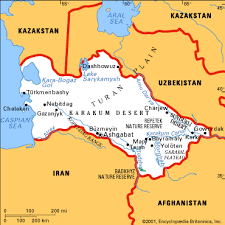Wednesday, April 22, 2009
 Gas diplomacy heats up over Turkmen supplies
Gas diplomacy heats up over Turkmen supplies
 ALMATY, April 21, 2009 (Reuters by Maria Golovnina) - Turkmenistan hosts a high-profile energy conference this week which is likely to turn into a diplomatic battlefield between Russia and Europe, both seeking control over gas flows from the energy-rich nation. Europe has courted the remote Caspian country as it seeks to diversify supplies and reduce its gas dependence on Russia. Moscow is irritated by these overtures because it sees ex-Soviet Turkmenistan as part of its traditional sphere of interest. On April 23, officials from the opposing camps will come directly head to head when delegations from Russia, the United States and Europe descend on Turkmenistan to attend an energy security conference organised by the government. Turkmenistan -- Central Asia's biggest gas exporter -- sells most of its gas through Russian gas monopoly Gazprom (GAZP.MM) but it has shown growing willingness to open new lines to Europe as it develops untapped fields. Diplomacy intensified this month after a gas explosion on a key Turkmenistan-Russia pipeline highlighted the vulnerability of gas flows and reinforced the West's determination to end Turkmenistan's dependence on Russia. "This explosion has given Turkmenistan an additional excuse to seriously think about alternative supplies to Europe," said Valery Nesterov, an analysts with Troika Dialog in Moscow. "It's a growing trend in Turkmenistan and it's understandable." Russia's energy minister, U.S. state department officials and executives from global multinationals will gather in Turkmenistan for the conference on Thursday and Friday. The official agenda is transportation of energy -- a hot topic since the April 9 explosion which Turkmenistan says was caused by Russia's abrupt reduction of imports. Gazprom has not commented on Turkmen allegations. Analysts say Russia could benefit from reduced flows at a time when demand in Europe is falling, a worrisome assertion for Turkmenistan whose economy relies on Russian purchases. "The age of monopolies is coming to an end," said a Turkmen government source, adding that the Turkmen government saw diversification as key to preventing any further disruptions.
ALMATY, April 21, 2009 (Reuters by Maria Golovnina) - Turkmenistan hosts a high-profile energy conference this week which is likely to turn into a diplomatic battlefield between Russia and Europe, both seeking control over gas flows from the energy-rich nation. Europe has courted the remote Caspian country as it seeks to diversify supplies and reduce its gas dependence on Russia. Moscow is irritated by these overtures because it sees ex-Soviet Turkmenistan as part of its traditional sphere of interest. On April 23, officials from the opposing camps will come directly head to head when delegations from Russia, the United States and Europe descend on Turkmenistan to attend an energy security conference organised by the government. Turkmenistan -- Central Asia's biggest gas exporter -- sells most of its gas through Russian gas monopoly Gazprom (GAZP.MM) but it has shown growing willingness to open new lines to Europe as it develops untapped fields. Diplomacy intensified this month after a gas explosion on a key Turkmenistan-Russia pipeline highlighted the vulnerability of gas flows and reinforced the West's determination to end Turkmenistan's dependence on Russia. "This explosion has given Turkmenistan an additional excuse to seriously think about alternative supplies to Europe," said Valery Nesterov, an analysts with Troika Dialog in Moscow. "It's a growing trend in Turkmenistan and it's understandable." Russia's energy minister, U.S. state department officials and executives from global multinationals will gather in Turkmenistan for the conference on Thursday and Friday. The official agenda is transportation of energy -- a hot topic since the April 9 explosion which Turkmenistan says was caused by Russia's abrupt reduction of imports. Gazprom has not commented on Turkmen allegations. Analysts say Russia could benefit from reduced flows at a time when demand in Europe is falling, a worrisome assertion for Turkmenistan whose economy relies on Russian purchases. "The age of monopolies is coming to an end," said a Turkmen government source, adding that the Turkmen government saw diversification as key to preventing any further disruptions.WEST VS RUSSIA: Turkmenistan produces about 75 billion cubic metres of gas a year and sells about 50 bcm to Gazprom. As part of its diversification, it is building a separate pipeline to China. The Nabucco pipeline, designed to ease Europe's reliance on Russia, will be at the centre of talks in Ashgabat this week but analysts say the project may be headed for failure unless the EU commits to buying Caspian gas quickly. [ID:nLG112121] There are also concerns that Turkmenistan, which has yet to confirm its reserves, has enough gas for everyone. Its position was reinforced however last year when Gaffney, Cline & Associates classified a Turkmen gas field as one of the world's biggest. As closed-door negotiations heat up ahead of the conference, the United States sent a senior State Department official to Turkmenistan last week, closely followed by a separate visit by a Russian Deputy Prime Minister. "The new administration in Washington is putting a lot of emphasis on Central Asia, and looking how we can develop our involvement here," U.S. Assistant Secretary of State Richard Boucher said during that visit. "If you have problems with any particular line, whether the problems are technical or something else, you need to have other alternatives," he said. "The basic principal though that I think we all agree upon ...is that of diversification.
Contact me:


